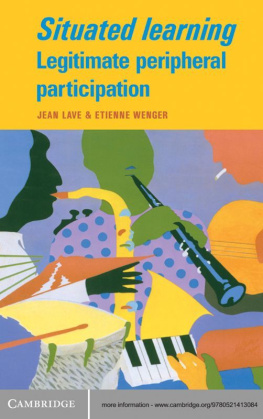Jean Lave - Situated Learning: Legitimate Peripheral Participation
Here you can read online Jean Lave - Situated Learning: Legitimate Peripheral Participation full text of the book (entire story) in english for free. Download pdf and epub, get meaning, cover and reviews about this ebook. year: 1991, publisher: Cambridge University Press, genre: Politics. Description of the work, (preface) as well as reviews are available. Best literature library LitArk.com created for fans of good reading and offers a wide selection of genres:
Romance novel
Science fiction
Adventure
Detective
Science
History
Home and family
Prose
Art
Politics
Computer
Non-fiction
Religion
Business
Children
Humor
Choose a favorite category and find really read worthwhile books. Enjoy immersion in the world of imagination, feel the emotions of the characters or learn something new for yourself, make an fascinating discovery.
- Book:Situated Learning: Legitimate Peripheral Participation
- Author:
- Publisher:Cambridge University Press
- Genre:
- Year:1991
- Rating:4 / 5
- Favourites:Add to favourites
- Your mark:
- 80
- 1
- 2
- 3
- 4
- 5
Situated Learning: Legitimate Peripheral Participation: summary, description and annotation
We offer to read an annotation, description, summary or preface (depends on what the author of the book "Situated Learning: Legitimate Peripheral Participation" wrote himself). If you haven't found the necessary information about the book — write in the comments, we will try to find it.
Jean Lave: author's other books
Who wrote Situated Learning: Legitimate Peripheral Participation? Find out the surname, the name of the author of the book and a list of all author's works by series.
Situated Learning: Legitimate Peripheral Participation — read online for free the complete book (whole text) full work
Below is the text of the book, divided by pages. System saving the place of the last page read, allows you to conveniently read the book "Situated Learning: Legitimate Peripheral Participation" online for free, without having to search again every time where you left off. Put a bookmark, and you can go to the page where you finished reading at any time.
Font size:
Interval:
Bookmark:
In this volume, Lave and Wenger undertake a radical and important rethinking and reformulation of our conception of learning. By placing emphasis on the whole person, and by viewing agent, activity, and world as mutually constitutive, they give us the opportunity to escape from the tyranny of the assumption that learning is the reception of factual knowledge or information. The authors argue that most accounts of learning have ignored its quintessential social character. To make the crucial step away from a solely epistemological account of the person, they propose that learning is a process of participation in communities of practice, participation that is at first legitimately peripheral but that increases gradually in engagement and complexity.
Learning in Doing: Social, Cognitive, and Computational Perspectives
Senior Editor Emeritus
JOHN SEELY BROWN, Xerox Palo Alto Research Center
General Editors
ROY PEA, Professor of Education and the Learning Sciences and Director, Stanford Center for Innovations in Learning, Stanford University
CHRISTIAN HEATH, The Management Centre, King's College, London
LUCY A. SUCHMAN, Centre for Science Studies and Department of Sociology, Lancaster University, UK
Plans and Situated Actions: The Problem of Human-Machine Communication
LUCY A. SUCHMAN
The Construction Zone: Working for Cognitive Change in Schools
DENIS NEWMAN, PEG GRIFFIN, and MICHAEL COLE
Situated Learning: Legitimate Peripheral Participation
JEAN LAVE and ETIENNE WENGER
Street Mathematics and School Mathematics
TEREZINHA NUNES, DAVID WILLIAM CARRAHER, and
ANALUCIA DIAS SCHLIEMANN
Understanding Practice: Perspectives on Activity and Context
SETH CHAIKLIN and JEAN LAVE
Distributed Cognitions: Psychological and Educational Considerations GAVRIEL SALOMON
The Computer As Medium
PETER BOGH ANDERSEN, BERIT HOLMQVIST, and JENS F. JENSEN
Sociocultural Studies of Mind
JAMES V. WERTSCH, PABLO DEL RIO, and AMELIA ALVAREZ
Sociocultural Psychology: Theory and Practice of Doing and Knowing
LAURA M. W. MARTIN, KATHERINE NELSON, and ETHEL TOBACH
Mind and Social Practice: Selected Writings of Sylvia Scribner
ETHEL TOBACH, RACHEL JOFFEE FALMAGNE, MARY BROWN PARLEE,
LAURA M. W. MARTIN, and AGGIE SCRIBNER KAPELMAN
Cognition and Tool Use: The Blacksmith at Work
CHARLES M. KELLER and JANET DIXON KELLER
Computation and Human Experience
PHILIP E. AGRE
Situated Cognition: On Human Knowledge and Computer Representation
WILLIAM J. CLANCEY
Communities of Practice: Learning, Meaning, and Identity
ETIENNE WENGER
Learning in Likely Places: Varieties of Apprenticeship in Japan
JOHN SINGLETON
Talking Mathematics in School: Studies of Teaching and Learning
MAGDALENE LAMPERT and MERRIE L. BLUNCK
Perspectives on Activity Theory
YRJ ENGESTRM, REIJO MIETTINEN, and RAIJA-LEENA PUNAMKI
Dialogic Inquiry: Towards a Sociocultural Practice and Theory of Education
GORDON WELLS
Vygotskian Perspectives on Literacy Research: Constructing Meaning
Through Collaborative Inquiry
CAROL D. LEE and PETER SMAGORINSKY
Technology in Action
CHRISTIAN HEATH and PAUL LUFF
Changing Classes: School Reform and the New Economy
MARTIN PACKER
Building Virtual Communities: Learning and Change in Cyberspace
K. ANN RENNINGER and WESLEY SHUMAR
The Learning in Doing series was founded in 1987 by Roy Pea and John Seely Brown
Legitimate Peripheral Participation
JEAN LAVE
ETIENNE WENGER

CAMBRIDGE UNIVERSITY PRESS
Cambridge, New York, Melbourne, Madrid, Cape Town,
Singapore, So Paulo, Delhi, Tokyo, Mexico City
Cambridge University Press
32 Avenue of the Americas, New York, NY 10013-2473, USA
www.cambridge.org
Information on this title: www.cambridge.org/9780521423748
Cambridge University Press 1991
This publication is in copyright. Subject to statutory exception and to the provisions of relevant collective licensing agreements, no reproduction of any part may take place without the written permission of Cambridge University Press.
First published 1991
24 th printing 2011
Printed in the United States of America
A catalog record for this publication is available from the British Library.
ISBN 978-0-521-41308-4 Hardback
ISBN 978-0-521-42374-8 Paperback
Cambridge University Press has no responsibility for the persistence or accuracy of URLs for external or third-party Internet Web sites referred to in this publication and does not guarantee that any content on such Web sites is, or will remain, accurate or appropriate.
It occurred to us at the same moment to dedicate this book to each other. We do so as a celebration of an extraordinarily happy collaboration, in which we experienced many of the things we were writing about.
The situated nature of learning, remembering, and understanding is a central fact. It may appear obvious that human minds develop in social situations, and that they use the tools and representational media that culture provides to support, extend, and reorganize mental functioning. But cognitive theories of knowledge representation and educational practice, in school and in the workplace, have not been sufficiently responsive to questions about these relationships. And the need for responsiveness has become salient as computational media radically reshape the frontiers of individual and social action, and as educational achievement fails to translate into effective use of knowledge.
This series is born of the conviction that new and exciting interdisciplinary syntheses are under way, as scholars and practitioners from diverse fields seek to analyze and influence the new transformations of social and mental life, and to understand successful learning wherever it occurs.
Computational media include not only computers but the vast array of expressive, receptive, and presentational devices available for use with computers, including interactive video, optical media such as CD-ROM and CD-I, networks, hyper-media systems, work-group collaboration tools, speech recognition and synthesis, image processing and animation, and software more generally.
These technologies are dramatically transforming the basic patterns of communication and knowledge interchange in societies, and automating the component processes of thinking and problem solving. In changing situations of knowledge acquisition and use, the new interactive technologies redefine in ways yet to be determined what it means to know and understand, and what it means to become literate or an educated citizen.
The series invites contributions that advance our understanding of these seminal issues.
Roy Pea
John Seely Brown
I first encountered these ideas in spring of 1990, when Jean Lave spoke at the Workshop on Linguistic Practice at the University of Chicago. There were about a dozen of us, mostly working on problems in language use and interaction; mostly anthropologists, linguists, or hybrids; several with research commitments to a non-Western language. I had just completed a study of reference as a social practice, in which I analyzed Yucatec Maya language use in its linguistic, indexical, and cultural contexts (1990). One of the central issues being pursued in the workshop was the relation between context and literal meaning or, in somewhat more technical terms, the role of indexicality in semantics. Coming from this angle, Lave and Wengers work was really exciting because it located learning squarely in the processes of coparticipation, not in the heads of individuals. The analogy to language was just below the surface, only occasionally made explicit during several hours of very fruitful discussion, and yet many of us felt that we had gained new insights into problems of language. We had already been exploring speech as interaction, trying to take meaning production out of the heads of individual speakers and locate it in the fields of social interaction. The 1990 presentation, and Jean Laves ability to engage intellectually in the issues it raised, provoked some of the best discussion we have enjoyed. My first reason for mentioning this background, then, is to say that this book, on which the speech was based, is very productive in the sense of setting forth a strong, provocative position on issues that are of basic significance to practice theory quite generally, and not only to how practice grounds learning. The second reason is simply to underscore the fact that my remarks in this foreword come from a certain perspective, and are necessarily selective.
Next pageFont size:
Interval:
Bookmark:
Similar books «Situated Learning: Legitimate Peripheral Participation»
Look at similar books to Situated Learning: Legitimate Peripheral Participation. We have selected literature similar in name and meaning in the hope of providing readers with more options to find new, interesting, not yet read works.
Discussion, reviews of the book Situated Learning: Legitimate Peripheral Participation and just readers' own opinions. Leave your comments, write what you think about the work, its meaning or the main characters. Specify what exactly you liked and what you didn't like, and why you think so.













